It’s mid-afternoon on Saturday 13 October 1979. I’m seven years old and I’m in the living room of my grandparent’s house at 85 Kenilworth Road, Aston, Birmingham. Out the window I can hear the crowds at the Aston Villa ground roaring in appreciation of another goal.
When I hear the unmistakeable final roar that signifies the end of the game, I will turn on the telly for the football results and Grandad and I will sit there as he fills in the pools coupon and finds, yet again, that he’s not won a penny. Once that ritual is complete it will be time for the exciting third episode of the current Doctor Who story, City of Death.
Earlier that morning Grandad and I spent a happy hour recording an improvised radio play on audio tape. He played Long John Silver and I was Jim Hawkins. We battled pirates and brigands, survived the curse of The Black Spot, fought swashbuckling cutlass fights, and retired to the Admiral Benbow Inn for ale after our exertions.

Grandad is now tending his homebrew, which bubbles and belches under the kitchen counter where he hides it from my Gran, who tolerates it but disapproves. Left to my own devices, I’ve taken the eiderdown from my bed upstairs – no duvets yet – laid it on the floor and put the sheepskin rug on top of it. I’m lying there on my tummy, reading. The gas fire warms the soles of my feet.
Next to me lies a pile of Doctor Who stuff.
Patrick Troughton stares seriously over the top of his 900 year diary on the cover of the 1968 annual. I have never seen Troughton’s Doctor on television; he’s practically mythical. But this annual has been in my bedroom since before I was able to form memories and I know every word of it off by heart. On top of it is a copy of Doctor Who Discovers Strange and Mysterious Creatures, and a new copy of The Making of Doctor Who.
But today I’ve chosen to dive into Terrance Dicks’ novelisation of Death To The Daleks. Its fabulous pop art cover is one of the most exciting things I have ever seen, and the book holds me rapt.
I hardly register the sound of the front door opening, signalling Gran’s return from her shift at Debenhams. She always brings back jam doughnuts or chocolate éclairs as a treat, and sometimes a toy car or some other plastic novelty. Today, however, I’m far too engrossed in the Doctor and Bellal’s struggle in the deadly city of the Exxilons to pay her arrival much heed.

Until she holds up a magazine and says, in her soft Brummie accent: “I found this at the newsagent’s and thought you might like it.”
I glance up and my eyes go wide with wonder. There’s the Doctor Who logo, and boggle-eyed Tom Baker standing next to a chummy Dalek. ‘Fantastic First Issue!’ screams the cover. I lay down my book, careful not to lose my place or break the spine, and I reach out for this fabulously exciting new thing.
“The newsagent said he could keep it for you every week, if you want,” says Gran. “Shall I do that?”
I nod mutely. Transfers! A picture of the first Doctor, even more mythical than his replacement! (Is this the first time I ever encounter the name William Hartnell?) Oh my god, a COMIC STRIP!
Gran potters into the kitchen, rustling her bag of doughnuts. I hear the door to the kitchen cabinet close as Grandad hides the offending glass demijohns from sight. The gas cooker fires up and the smell of grilled fish fingers slowly beats the smell of fermentation into submission. There’s a deafening roar from the Villa ground as the final whistle blows.
But I’m not paying attention to any of it.
I cut out Alien Fact Files with zigzag scissors and stick them into an exercise book. I glue all the photo files to pieces of cardboard that Gran brings back from work, the discarded packaging from nylon shirts. I learn about Zygons, Ice Warriors and Yartek, leader of the Alien Voord. I fall in love with Lalla Ward, and decide I want to grow up to be Absalom Daak.
It’s mid-morning on a Saturday in October 1980. I’m eight years old and I’m in the upstairs bedroom of the house that sits opposite my home in Gnosall, a small village on the Staffordshire/Shropshire border. We live on a newly built estate characterised by pothole-free roads, plasterboard walls and regular chimney fires. The house belongs to a young couple called Philip and Fidelma. He is some kind of engineer, and they often travel to Nigeria for weeks at a time. They brought me back a wooden tribal mask last time they returned.
I spend a lot of time in their house, hiding from the increasingly frequent fights between my mum and dad or, even worse, the long days of poisonous, resentful silence.
While this has been going on, Fidelma has kind of adopted me. Her house is a refuge and I am always welcome there. Today I am lying in her spare room with the new edition of Doctor Who – A Marvel Monthly.
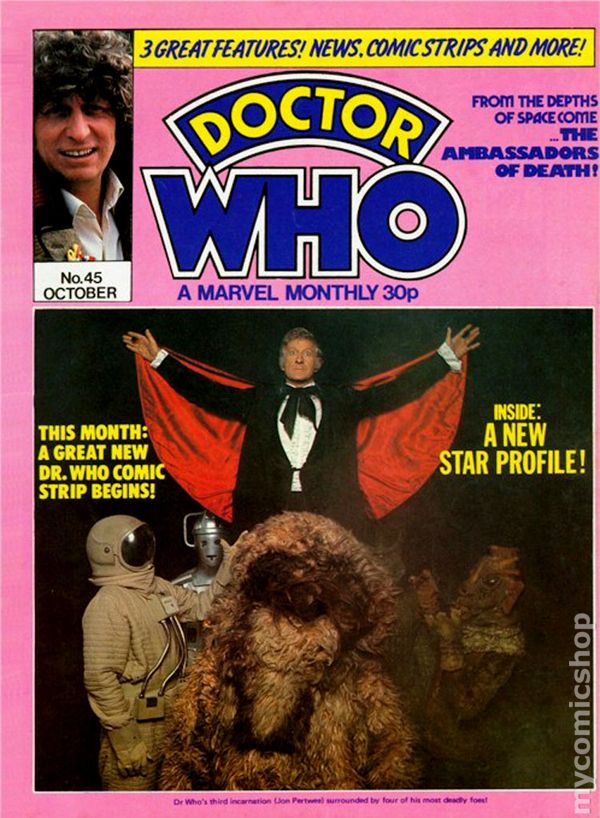
The cover is pink, and the picture is amazing. Jon Pertwee – another Doctor I have yet to see in action, although now I have all but one of his annuals – stands with his arms wide, red-lined cape hanging from them like bat wings. Below him crowd an assortment of monsters – a Yeti, an Ambassador of Death, a Cyberman and a Silurian. Underneath it the strapline reads: ‘Dr Who’s third incarnation (Jon Pertwee) surrounded by four of his most deadly foes’.
By now I am fan enough to know that the third Doctor never fought two of these enemies, and so the picture and its tantalising caption hints at untold adventures, a whole world of undiscovered Doctor Who stories waiting to be told. It is tremendously exciting.
I lie on that bed and stare at the cover for a long, long time, wondering what those stories could be. Yeti invading UNIT HQ! Cybermen strapping the Brigadier into a conversion machine! The Yeti and the Cybermen, united, controlled by the Great Intelligence, stalking the deserted streets of Birmingham!
When I finally open the magazine, there is a feature on a lost Doctor Who tale. Shada, the story that we never saw. That confirms it. The Doctor has had adventures – real, actual, honest to goodness adventures – that nobody has ever seen.
My imagination forces its way through these narrative crevices and emerges into a wider, more exciting universe. My mind fills with stories.
My stories.
Using the poster that comes free with issue fifty I transcribe the titles of stories into an exercise book. I have begun to keep lists. My parents divorce. I run from my Grandparents’ living room into the front room yelling that I’ve just seen an actual regeneration, and it was GREEN! Dad records the Five Faces of Doctor Who on video for me so I can watch them again and again; Hartnell, Troughton and Pertwee step out of myth and onto my telly. Troughton becomes my favourite Doctor. I get the newsagent near my new boarding school to keep Doctor Who Monthly for me, and I read each issue alone in my dormitory cubicle.
It’s late afternoon on a Friday in January 1983. I’m eleven years old and I’m walking with my Dad through the car park at Pebble Mill studios in Birmingham. It’s a cold day and the trees are bare. He has just been performing a song for Pebble Mill At One, a lunchtime magazine programme that forms the centrepiece of the BBC’s sparse daytime programming. We come here regularly, so the novelty has worn off somewhat.
Today, however, is slightly different. On our way out we meet Michael Bentine. He’s the guy who does that puppet show on kids telly. I kind of like it. Dad tells me he used to be part of something called The Goons, but I don’t really know what he’s on about. Don’t worry, Dad assures me, he’s got some tapes I can listen to. I’ll love it.
I ask for Mr Bentine’s autograph and he gladly obliges, asking me what I want to be when I grow up. Three years previously I was on telly, telling the whole of the Midlands region that I wanted to be a policeman. Since then I have realised that what I really meant is: I want to be Sherlock Holmes. There is only one way for me to make that wish come true.
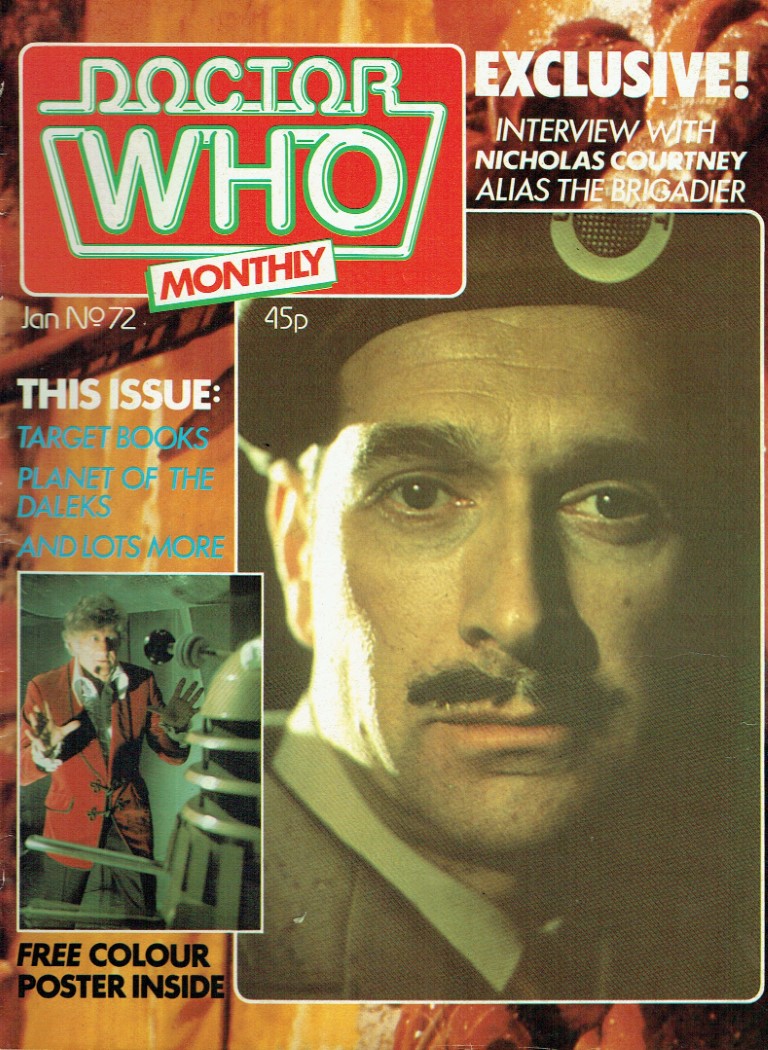
“I want to be an actor,” I tell him. He smiles, says “good lad,” and advises me to go to RADA because then anything will be possible. I nod, grateful for his advice. He sees the copy of Doctor Who Monthly Issue 72 sticking out of my pocket.
“I was nearly Doctor Who, once,” he confides to me. “It’s good, isn’t it?” He says. I nod mutely, astonished at this shocking tidbit of backstage lore delivered so casually in a draughty glass lobby. I want to ask him to explain this revelation, but I know it would be rude to press him when he’s on his way home. He smiles and wanders off.
Now I’m walking with Dad back to our Allegro, wittering on about the contents of this exciting issue.
“There’s going to be a new companion,” I say excitedly. “He’s called Turloff.”
“Sounds alien,” says Dad, indulgently.
“I know,” I reply in awe.
And maybe, a voice at the back of my head whispers, maybe one day you could be a companion in Doctor Who. Or even the Doctor himself. Michael Bentine said anything was possible, and he should know. He was almost Doctor Who himself, once.
At Longleat, Peter Davison walks towards me in full costume, holds out his hand and says ‘Hello, I’m the Doctor!’ but Dad has forgotten to bring his camera. We’re allowed an evening without homework so we can watch The Five Doctors. Dad remarries, and I change schools. The VHS fails to record Frontios part four. It will be years before I finally see it. Some bloke called Colin is the new Doctor. I hear it on the radio at lunchtime and wait impatiently for the Six O Clock news so I can see what he looks like.
It’s June 1984. I’m twelve years old and I’m walking through the recreation rooms in my new boarding school. I’ve got a thick, white woolly jumper on and I’m listening to Paul Young’s No Parlez album on my bright red plastic Sanyo walkman. It hangs at my waist, suspended from a shoulder strap. My headphones have orange foam ear protectors.
The rooms are painted white and have banks of lockers up against the far walls. One room houses a ping pong table where two boys are playing. I move on through, looking for somewhere quiet to be alone. I am not yet sure whether I like my new school.
I go out the back door and across the courtyard to the tuck room in the old stables. Here we are allowed to keep our tuck boxes, full of whatever goodies we’ve brought with us from home. My wooden tuck box has a white skull and crossbones painted on it, and my name underneath in calligraphed script. My grandad decorated it for me a few years ago as part of a treasure hunt he created for Christmas morning. The treasure chest contained a map that led me to a spot where I dug up some chocolate coins.
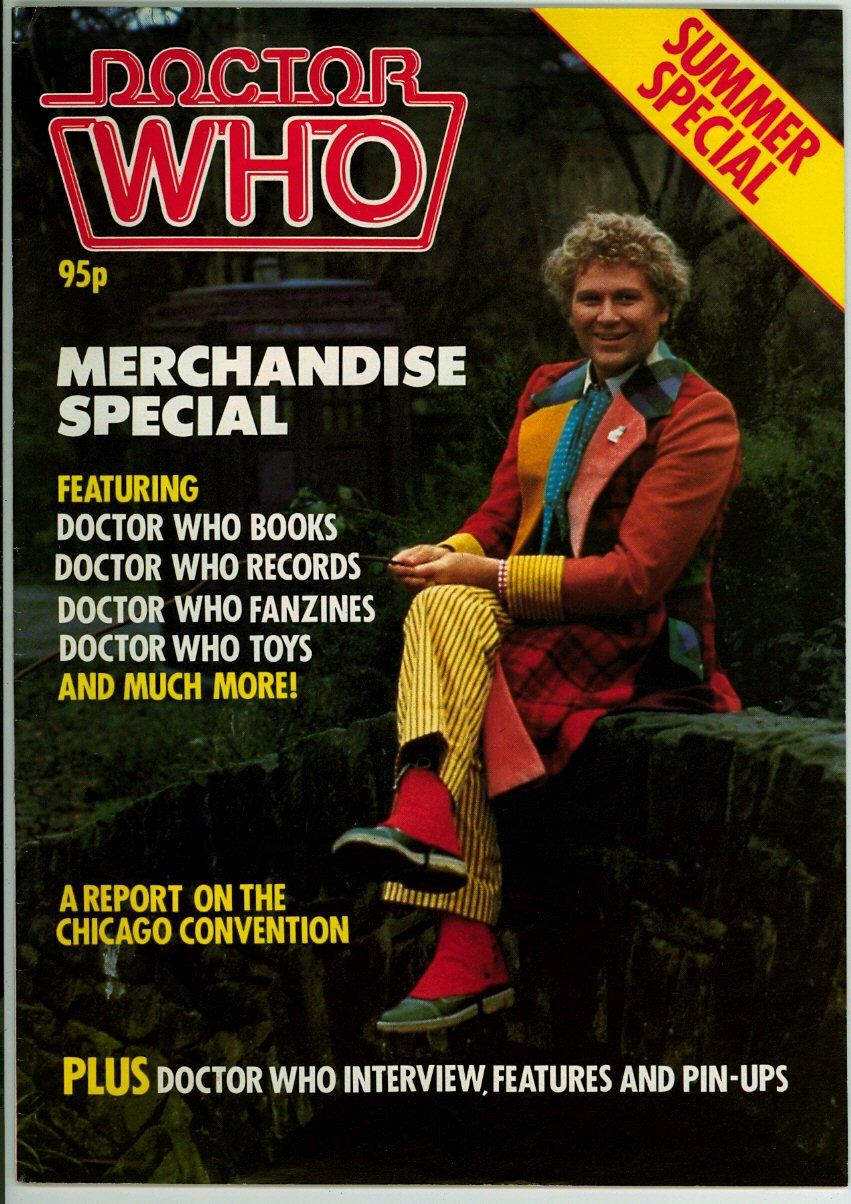
Now it contains a fruit cake made for me by my Gran, and the Doctor Who Magazine Merchandise Special. The special has the new Doctor on the cover. I’m not so sure about him yet, but although his one telly appearance left me unconvinced, the new comic strip that’s just begun in the monthly has reassured me.
I’ve accumulated quite a collection of Doctor Who stuff. My small bedroom back home is full to the brim of jigsaws and board games, Target books and annuals, audio cassettes, a thrilling plasticine diorama, a cut-a-mastic set for making polystyrene silhouettes of Daleks, 3D Visionmaster discs, a talking Dalek, Dalek bubble bath, a Tom Baker doll and more, all eagerly snapped up at jumble sales, fêtes and dusty junk shops.
This special is like a portal into a whole world of stuff I simply have to, have to have. I become particularly obsessed with tracking down ‘Dr Who’s Anti-Dalek fluid neutraliser’ – for some reason ‘Dr Who’s Anti-Dalek Sonic Disintegrator Gun’ doesn’t hold the same fascination – and the Dalek handbook. I would never, alas, track down either.
But I thumb that issue over and over again, memorising the names and packaging of rare items so that I will recognise them even if I catch only a glimpse of the box’s corner sticking out of a pile of stuffed toys in a church hall in Wolverhampton on a dreary Sunday morning.
I sit there in that cold room, munching my cake and listening to my music, committing the outline of a plastic water pistol to memory in case I ever encounter one without its packaging.
Doctor Who is cancelled and then reprieved. I fill a scrapbook with press cuttings brought in for me by classmates who cut them out of their parents’ papers. I can’t watch Season 22 on the telly in our common room. Dad’s VHS fails to record the final five minutes of Revelation of the Daleks. It will be years before I finally see it.
It’s a Saturday afternoon in September 1985. I’m thirteen and I’m the attic room of a house in Nantwich. I am here with my Mum, and together we’re visiting a couple who were friends of my parents when they were together.
I don’t see my Mum that often, and when I do she sometimes tries too hard to make the meeting special, which makes me awkward and uncomfortable. This time, however, she’s got it just right.
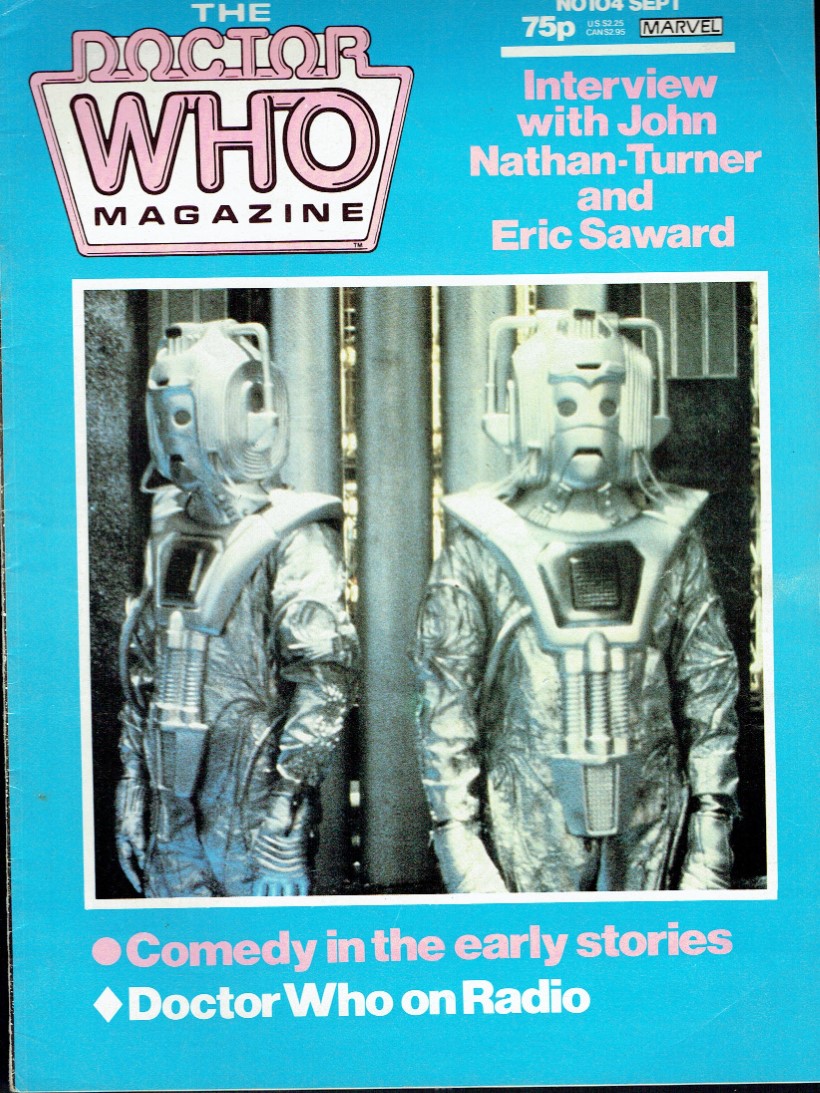
We’ve been on a shopping trip. I’ve bought a pulpy Flash Gordon paperback and Issue 104 of The Doctor Who Magazine, but the highlight was when we stopped off in Boots and Mum brought me a disc camera and some films. My first camera! I excuse myself once we get back to the house and run upstairs to the attic room. It’s dark and gloomy up here, three storeys above the kitchen. Silent, too.
I take my camera out of its faux leather zip-up pouch and feel the texture of its brushed metal case. This is so cool. But there’s not much fun to be had with it on my own, so I soon put it away and turn my attention to DWM. I think the cover’s a bit naff, the two Cybermen look bored out of their minds, and the bright blue border is too garish.
I have become capable of criticism and occasional disappointment.
Inside is the exciting news that there is going to be a Doctor Who radio series. I have three audio cassettes of Doctor Who – Genesis of the Daleks, Tom Baker reading State of Decay, and Doctor Who and the Pescatons. I have played them all so many times that they sound wobbly and warped.
My copy of Pescatons is particularly prized. Dad got it for me by writing to the record company after I found out about in an old DWM and begged him to get it for me. It was long out of print, but they posted him a free copy they had lying around the office just because he asked so nicely.
Now there’s going to be a new audio adventure, which means a new tape for my shelf. I devour the details, somehow more excited by this than I would be by a TV story being announced. Novelty adds a thrill.
Eventually, though, I begin to feel guilty. I really want to stay up here reading DWM cover to cover, but I’m only with Mum for the afternoon and I know that it’s unfair of me to hide away, even if I do want to read the article about Doctor Who villains of the 1960s. I close the magazine and go back downstairs.
I can always finish it tonight, when I’m back at school.
O Levels come and go – literally, for mine is the last year to take them. With retakes, I just about scrape into the sixth form. I stop boarding and become a day pupil. Patrick Troughton dies. I discover that wearing a long black coat and brooding attracts girls. I like girls. I am expelled from school, but then given a reprieve. I produce our House Drama competition entry two years in a row, the first time with glittering success, the second time, utter, abject failure. A classmate’s Dad works on Doctor Who and he smuggles me scripts and props from the set of seasons 25 and 26. I travel home from school carrying a huge plastic bomb from the set of Wolves of Fenric and a haemovore mask and glove with which I unwittingly scare my stepmother so badly I make her cry.
It’s a cold Saturday morning in February 1989. I’m seventeen years old, I have no idea where I am, and I am experiencing my first hangover.
The previous night is a blur. I remember arriving at the pub, I remember matching my friends pint for pint, I remember snogging a girl called Ann (I think) in an alleyway and then leaving her to go into the nightclub where the girl who’d just dumped me was dancing with her new bloke, and then… I woke up on a sofa in a strange house covered in my own sick.
There’s something else, though. Something about Doctor Who. I can’t quite remember it.
I drag myself off that sofa, out into the harsh morning light, and make my way across town. I head for the flat of my friend Polly, who lives practically next door to my school in Newport, Shropshire. I can clean myself up there before heading home.
Pol is in her early twenties, is dating a friend of mine, and lets a bunch of us come round to her flat on the weekends to watch old sci-fi movies.
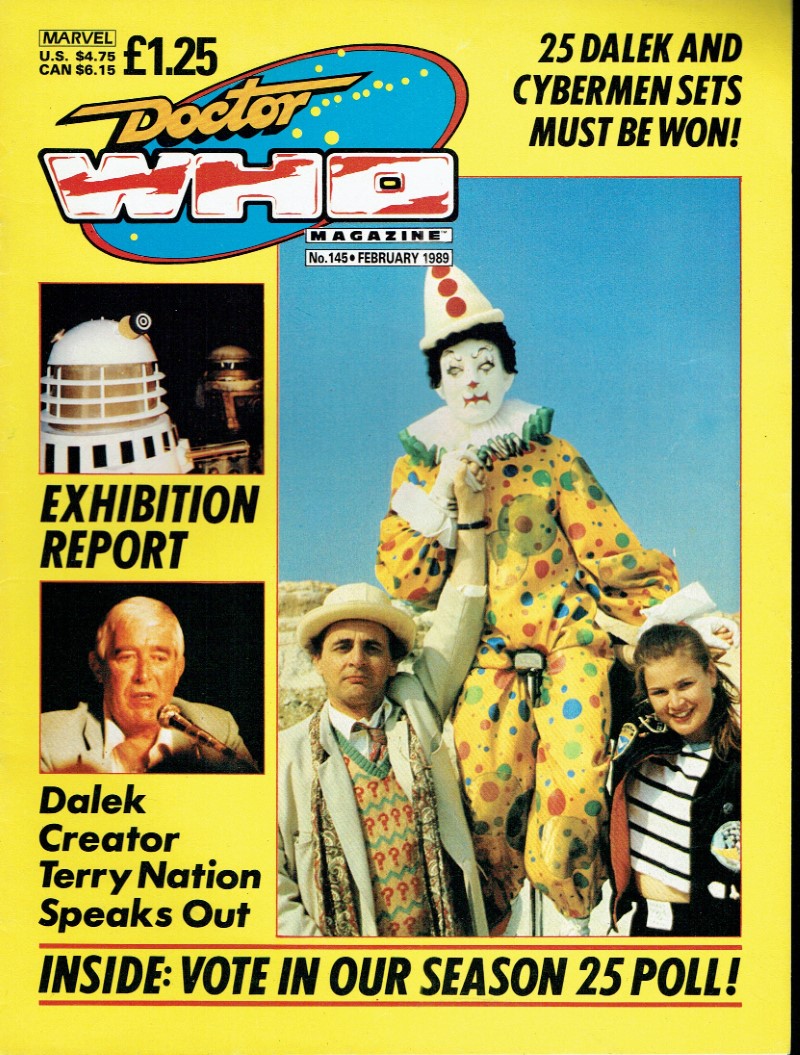
On the way there I pick up a copy of DWM 145 from a newsagent’s that is just raising its shutters. When I get to the flat, the curtains are closed. She’s not awake yet. I decide to let her sleep in, so I sit on the cold steps that lead up to her front door and read the magazine.
When I get to the article on Piccolo’s book The Making of Doctor Who, and the picture of the original cover, I have a sudden flash of memory.
Did I really see Jon Pertwee, in full third Doctor costume, walking through the saloon of the pub last night? And did I really stand up and loudly harangue him for not being quite as good as Tom Baker? Surely not. That’s a ridiculous idea.
I try to focus on the Terry Nation interview but I keep hearing snatches of my voice shouting abuse at one of my heroes and eventually I realise that no, my memory is not cheating. Somehow, yesterday, during my first ever drunken night out, I harassed Jon Pertwee. I have no idea how this can have happened, but that face staring up at me from the pages of DWM has brought it all back. I blush, and clutch my aching head.
I am never, ever going to get drunk again.
I hear a sound from inside the flat and look up to see the bedroom curtains are open. I knock on the door and Polly opens it in her dressing gown, looking sleepy and confused. She smiles when she sees me and then says: “What the bloody hell happened to you? You look like you’ve been dragged through a hedge backwards.”
I put the magazine in my pocket and follow her inside, drawn by the smell of fresh toast and stale perfume.
Doctor Who is cancelled. I see Jon Pertwee leave the stage and David Banks take his place; he’s brilliant. School ends. University comes and goes. I spend time living abroad in Belgium, Canada and Poland before returning to England. I manage to get DWM every single month, either through specialist shops or by having it posted to me. I read every Virgin New Adventure and get work as a writer of comics and magazine articles. I pitch five Doctor Who novels to Virgin and the BBC and am always told ‘close, but no cigar, keep trying’. I start auditioning and am offered roles in a variety of amateur and fringe productions. I start going to the Fitzroy Tavern each month, and become a part of organised fandom. I have a story published in a Short Trips anthology. An agent approaches me, interested in representing me as an actor.
It’s a rainy weekday evening in October 2003. I’m thirty-one years old and I’m sat in a dingy pub in Whitechapel, two streets away from the site of one of the Ripper murders.
I have a date this evening, my first in a while, and I’m really hoping I don’t manage to screw it up. I’m so anxious that I’ve arrived forty-five minutes early and have had to take refuge in this dodgy pub, which hasn’t had a makeover since Doctor Who Magazine was a weekly publication.
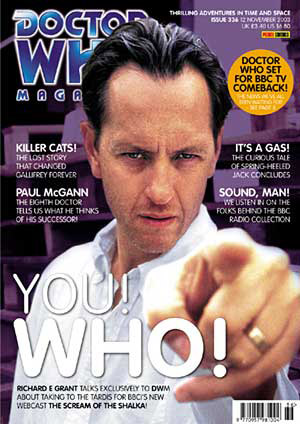
I’m drinking a pint and reading about the recording of Scream of the Shalka. I’m pretty excited about this production. I work for the BBC at the moment, so I knew there was a photo shoot going on over the road in TV Centre a few weeks back. Plus, I know Paul Cornell just about well enough to be personally pleased that he’s getting a chance to create his own Doctor. I feel plugged into the background hum of Doctor Who gossip and I have a feeling that a big announcement, bigger than Richard E Grant, is imminent.
But clearly I’m not as plugged in as I think I am, because suddenly there it is. A small paragraph and a quote from Russell T Davies. Doctor Who is coming back to BBC 1. Oh my God.
My immediate instinct is to jump for joy. But then a dreadful thought occurs to me. I haven’t told my date that I’m a Doctor Who fan yet. And there’s no way on earth that I’m going to be able to contain my excitement at this news for a whole evening. I’m bound to blurt it out at some point and then the cat will be out of the bag. Being a Doctor Who fan could be a deal breaker; it has been before.
I actually close DWM and throw it on the table, annoyed at it for telling me now, for forcing my hand. I like this woman. A lot. I let my copy of DWM lie there in a small puddle of beer for a moment or two thinking: ‘there, soak up that ale, serves you right’. It’s only then that I notice the announcement about a return to telly is actually on the cover and somehow I hadn’t noticed it. I have been taking DWM, I realise, for granted.
I pick it up and wipe it dry, full of sudden remorse for mistreating an old friend so.
I check my watch. Time to go. I down my pint and drop my soggy DWM into a bin before I leave. It’s okay, I think, I’ll buy another copy on the way home. And this way, she won’t see it in my pocket and ask about it. I can keep my secret for another date, when we know each other better.
I drop it into conversation before the starters even arrive.
Doctor Who is reborn. DWM regenerates. I get married and become a Dad. I sell my collection of merchandise, scripts and props because there’s no room for them, not with a baby on the way. I act in two Big Finish audio plays, one of which is given away free with DWM 351, but otherwise abandon acting in order to take a nine to five job that keeps food on the table. After twenty years of trying, a pitch gets accepted and I become a ‘proper’ writer, with three novels and four Big Finish scripts to my name.
It’s the evening of 7 January 2010. I’m Thirty-eight years old and I’m walking through the front door of my home in Hildenborough, Kent. My young son Thomas comes crawling out of the living room.
“Daddy!” he shouts. “Eeyo Daddy! He reaches me, uses my trousers to pull himself upright and lifts his arms up for a cuddle.
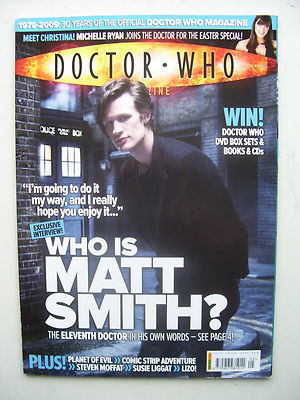
“Daddy!” comes a loud yell from the top of the stairs. Kitty, my four year old daughter, comes pelting down the wooden staircase and flings herself at me, hugging me tight. She sees a magazine sticking out of my bag and grabs it, stepping back to the table and laying it out to examine.
“Wow, it’s the new Doctor Who!” she says, awestruck by Matt Smith’s first promo shot.
Kitty and I have a deal. She will be allowed to watch Doctor Who when she turns five. Showing her The Hand of Fear when she was three led to a string of nightmares for which her mother still hasn’t quite forgiven me. But making it forbidden fruit has only fuelled Kitty’s obsession. She is forever asking to watch the watch the one with ‘Sarah-Jame and the scary hand’ or the one with ‘Marfa and the nasty crabs’.
Although she’s only seen a few carefully selected episodes, she can already recognise each of the past Doctors, although David Tennant is her ‘favouritest and I like him, Daddy, SO much’. This is because, while she cannot watch it on telly, DWM gives her a monthly hit that keeps her interest going. She pounces on each new copy and sits flicking through it, shouting out excitedly ‘Daleks!’ or ‘Cybermen!’ or ‘Sarah-Jame, Daddy, look!’
“It’s Sarah-Jane, sweetheart.”
“That’s what I said. Silly Daddy. Sarah-Jame.”
When she and I have both finished with it, I put issue 417 up on a shelf with all the others. They’ll be there for her to discover when she turns five, when she can read.
I’m not naïve, I know that Kitty probably won’t grow up to be a Doctor Who fan. She’ll find her own passions and enthusiasms and rebel against mine. That’s as it should be.
But sometimes I catch her looking up at that shelf full of wonders when she thinks I cannot see, eyes wide with anticipation, eager to begin.
And I envy her.
This article was originally published in issue two of Vworp Vworp!, objectively the greatest Doctor Who fanzine ever, and you should buy every issue right away.